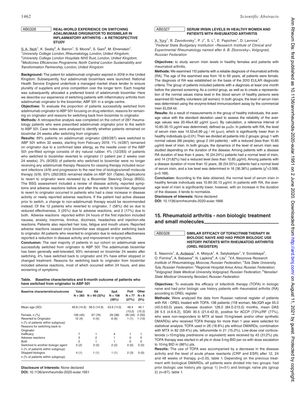Real-World Experience on Switching Adalimumab Originator to Biosimilar in Inflammatory Arthritis – A Retrospective Study
June 2020
in “
Annals of the rheumatic diseases
”

TLDR Most patients successfully switched from the original adalimumab to a biosimilar with few reverting due to reduced effectiveness or side effects.
In a retrospective study of 287 rheumatology patients who were prescribed adalimumab originator for inflammatory arthritis, 99% (283/287) were switched to the biosimilar ABP 501. The switch occurred within 32 weeks starting from February 2019. Of those switched, 93% (262/283) remained stable on ABP 501 after 24 weeks, while 4% (12/283) reverted to the originator and 3% (9/283) stopped receiving adalimumab therapy. The main reasons for reverting to the originator were reduced effectiveness (58% of those who switched back) and adverse reactions (25%), which included symptoms like nausea, anxiety, insomnia, tinnitus, dizziness, headaches, injection-site reactions, hair loss, fatigue, and mouth ulcers. These adverse reactions ceased after stopping the biosimilar or reverting to the originator. Overall, the study concluded that the majority of patients were successfully switched to the biosimilar, which was generally well-tolerated.




